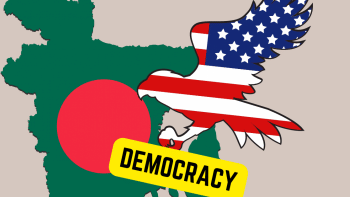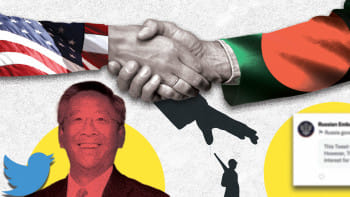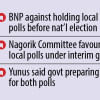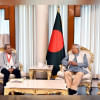US, India, and the election in Bangladesh

There has always been a feigned attempt by the diplomatic corps in Dhaka to keep their role (read: meddling) in Bangladesh's politics under wraps. Quite understandably, neither our politicians nor the diplomats feel comfortable discussing such matters openly. But predictably, the foreign diplomats appear to have become more active with the 12th parliamentary election less than a year away.
In recent months, there have been quite a few visits from countries that are deemed to have the potential to wield significant influence on Bangladesh politics, especially around elections. A number of top US officials visited Bangladesh for talks with government officials, civil society members and senior journalists over the last few years. The Indian foreign secretary visited on February 15. The Chinese foreign minister, on his way to Africa, stopped by in Dhaka in January for a brief meeting with his Bangladeshi counterpart at the airport. Usually, newly appointed Chinese foreign ministers begin their stint with a tour of Africa. This time, however, the minister seemed to consider Bangladesh important enough for a brief stopover on his first trip abroad.
This flurry of visits cannot be brushed aside as merely coincidences. They are more of a sign that Bangladesh has gained importance in the region. Interestingly, none of these visits had politics anywhere on the agenda, neither were the talks on politics – not officially, at least. And yet, two comments, made on the same day, appear to be rather intriguing.
Before that, one should perhaps go back a little for context. On November 21, 2021, this daily reported that Ambassador Kelly Keiderling, US deputy assistant secretary of state overseeing south and central Asia, said the Biden administration had decided to take out India from relations with the five other South Asian countries "to deepen US relationships with them." This meant that the US would be seeing Bangladesh from its own lens and not through India's. There is much to speculate about the Indian stance regarding Russia vis-a-vis the US since the invasion of Ukraine and how that lens might vary. The once warm India-US camaraderie has certainly cooled down a bit, but it could turn into a full-blown rift – we can't say yet. This tussle of giants is what Bangladesh must navigate through without getting in their way or getting caught in the crossfire.
Bangladesh is geopolitically important now, but the government must be cautious. When the whole world is facing an economic crisis and the election is closing in, any slip could spell doom for us.
The visiting Indian Foreign Secretary Vinay Kwatra also assured that Prime Minister Sheikh Hasina had full support of his country. "We have total support for you and your leadership," a PMO spokesperson quoted him as saying to the premier during their meeting at Gono Bhaban on February 15.
It could be a polite and courteous reassurance that India remains an ally, since relations with India have reached a new high over the last decade that the Awami League has been in office. But given the context and the critical juncture at which the remark was made, it appears that India is most likely hinting that it will remain beside the Awami League as they have in the past. This is significant since the American and European diplomats have been talking about free and fair elections for quite some time.
On the same day, Derek Chollet, counsellor of the US Department of State, said, "I have confidence there can be a free and fair election. The government has said they want to have a free and fair election. We've made no secret of the concerns we have had about the treatment of certain advocates in civil society, particularly in human rights, concerns about previous elections.
"The US will continue to voice those concerns in the months to come. But sure, we have confidence and we have heard from the government today their commitment to hold a free and fair election. And we'll hold on to that," he added.
During the meeting with Derek Chollet at Gono Bhaban, Prime Minister Sheikh Hasina said, "The next election will be fair and free. I fought for democracy throughout my life."
Now, there is India which has full confidence in Sheikh Hasina, and then there is the US that wants to see a free and fair election in Bangladesh. It might be flattering that both India and the US want to get Bangladesh on their side, and then there is China, who presumably also has interests in Bangladesh. Bangladesh would also not want to do anything that even hints at ignoring China. But all that must be done in delicate balance, considering the bigger powers at play.
Bangladesh is geopolitically important now, but the government must be cautious. When the whole world is facing an economic crisis and the election is closing in, any slip could spell doom for us. There is our economy to think about, especially during these hard times. And Bangladesh relies heavily upon the US as a destination of our exports and a source of our remittance. On the other hand, countries cannot change neighbours and must live with them ever after – preferably in peace, even if not in happy harmony.
Now, what the ruling party does must be based on the best possible outcomes in terms of national interests, which may not necessarily coincide with short-sighted partisan interests. This is where we must have full confidence in the prime minister's leadership as well. More than foreign diplomats, it is important that we, the electorate, have faith in the prime minister's prudence and courage to decide on the right course. And if not, we, the electorate, should have the means to hold her accountable – by the ballot, if need be.
Mohammad Al-Masum Molla is chief reporter at The Daily Star.

 For all latest news, follow The Daily Star's Google News channel.
For all latest news, follow The Daily Star's Google News channel. 










Comments